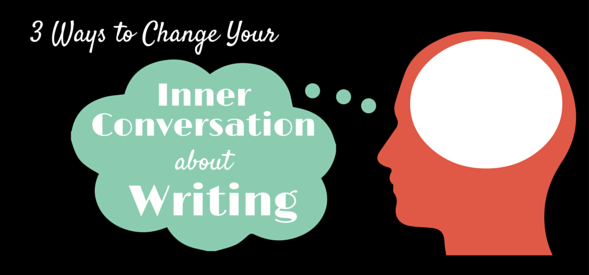As I mentioned in a recent post, as writers –particularly undertaking big writing projects like a book, novel, screenplay, or even NaNoWriMo! — we need to be mindful about our self-talk and keep it as encouraging and self-supportive as possible.
This is because one of our main tasks (aside from doing the actual writing) is preventing the freaked out voices of fear, self-doubt, and even a little panic (!!!) at times, from stopping us. Those voices may be loud, scary, and intimidating, but it doesn’t mean they are right. As writers, we have to learn not to take them seriously and how to kick them to the curb so we can keep doing what we were put here to do.
1. Use the power of yet
I read a powerful post the other day called, “The Power of Yet”.
The core idea is to add the word “yet” to a negative thought.
Like this:
- You might catch yourself saying, “I don’t know how to solve this plot problem.”
- You can quickly add “yet”, to make it, “I don’t know how to solve this plot problem yet.”
Isn’t that interesting?
It takes a defeated “fixed” perspective and cranks it sideways to make room for possibility. And I’m a firm believer in the power of our subconscious minds to help us solve unsolved problems. A “yet” sets the stage for room to solve, grow, learn, discover. You may not know how yet :), but you will!
I love the power of this simple mindset strategy to change how you’re approaching your writing life.
- “I’m not good at plotting.“
- “I’m not good at plotting yet.“
Or
- “I don’t write characters very well.“
- “I don’t write characters very well yet.“
It’s an “I’m still learning” stake in the ground against the forces of darkness and negativity.
I love it!
2. See fear and doubt as familiar visitors you know how to handle
We all have a particular conversation that comes up when we’re feeling the doubt and facing the fear head on. It sounds different for each person, though there are common threads.
You might hear things like:
- “You’re not good enough.“
- “This is too hard.“
- “You’re unoriginal.“
- “I’m bored with this.“
- “I’m not cut out to handle this.“
- “You’re doing it wrong.“
The thing is, most of these comments come whizzing through our brains at lightning speed and kick us in the gut before we even know what happened.
And then we’re feeling bad, not believing in ourselves and our work, and pretty soon we’re not writing for the day or even blocked. It’s like, BAM, day over.
How to change it up
The way to change this whole pattern is to NOTICE it.
Notice what your particular conversation is.
Write it down.
That’s right. Put it on paper in black and white so you can really see it.
You might notice that’s not even true!
You might also notice that you’ve been hearing those same thoughts over and over and over again.
No surprise there. It’s your familiar visitor, one you’ve seen before (and one you will see again).
Why this even happens at all
Here’s why this happens: When we take on a big dream through the auspices of a Big Damn Writing Project, the fearful, amygdala-driven part of our brains FREAKS OUT. “What? She’s going to put herself out there like that? Is she crazy? We’ll be ridiculed and exposed again, just like that time in second grade!! Oh no!!” And then the inner critic kicks into high gear, damage-control mode. “WHOOP WHOOP WHOOP”, go the sirens. “RED ALERT! ALL SYSTEMS ON LOCKDOWN!”
That’s what’s going on behind those mean, horrible things you’re saying to yourself.
They are cleverly, evilly, insidiously designed to SHUT YOU DOWN so you don’t “get hurt”.
But big surprise, inner critic, you actually WANT to do this project. :)
So your job is to say, “Oh, hold on, I see that you’re equating this project with that painful experience in high school when you had to speak in front of the entire class and everyone laughed at you in a way that felt like you were going to melt into a giant puddle of liquid shame-goo, but this isn’t the same thing. I’m a grown up now, and I actually want to do this project. So I’m going to take care of you, and me, and I promise we’ll be okay. We can do this thing.”
3. Reframe your negative messages
One of the most powerful things we do on a daily basis in the Writer’s Circle is to use our online journaling system to reframe the negative messages that show up each day.
The first step is to note what the negative message is.
For example: “I’m not fast enough.”
The second step is to take a look at that message in all its black and white glory and ask yourself, “How can I reframe that with a more positive perspective?” You might even want to pretend your best friend came to you saying that about herself. What would you say to her?
It might be something like, “I’m writing as fast as I’m capable of right now, and I’ll only get faster over time.”
Isn’t that a bit kinder?
You might even try “yet” here, though I’d probably change it to something like, “I’m not as fast as I want to be yet.”
What’s your inner conversation like?
Here’s an invitation for you. If you’re feeling brave, tell us a self-directed negative thought you’re holding about yourself as a writer by posting it in the comments. Then see how you might be able to reframe it or add the word “yet” to change it. If you need help, just say so and I’ll be your coach for the day.
And don’t miss our Writer’s Circle special for new writers in honor of NaNoWriMo for our session that starts on Monday. (No, you don’t have to participate in NaNo to use the coupon!)
You may also be interested in:
- Why we procrastinate, especially about the stuff that really matters
- 12 tips for making the most of NaNoWriMo
- To NaNo or not to NaNo
- Riding the emotional ups and downs of writing (Guest post by Isabel Holtreman)
- Ramp up your writing speed (Guest post by Nicola Pittam)



I’ll never crack this story.
Oh, that’s a good one, Victoria! I was just wrestling with it myself.
I would try: “I haven’t cracked this story yet.”
Or, “If I just keep at it, I know I’ll find a way into this story.”
Incidentally, I found that discussing my story breaking problem with a trusted colleague really helped me open it up. What was useful is that she primarily asked questions and let me answer them, rather than telling me what she thought I “should” do. She also pointed out some logic aspects that were making sense and others that were seeming too complicated, which made it easier for me to decide how to move ahead. It’s funny how hard it is to “see” our own stories clearly sometimes.
I love the “yet” concept — thanks so much for sharing!
Glad you like it, Rebecca!